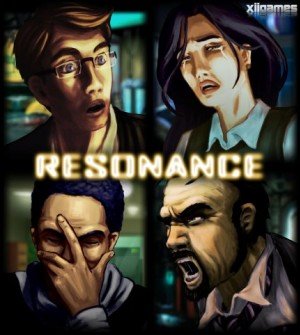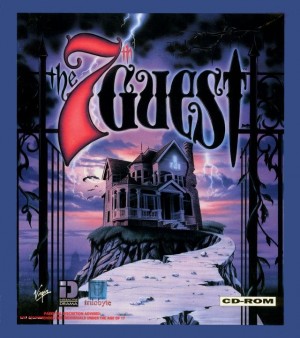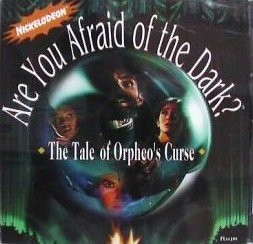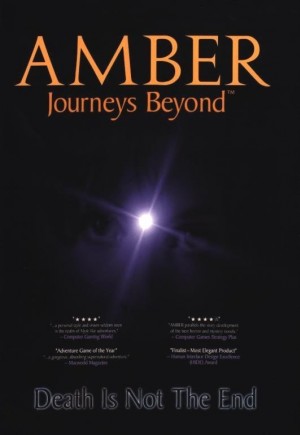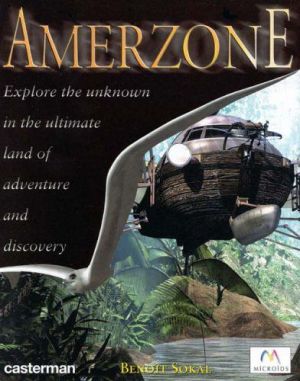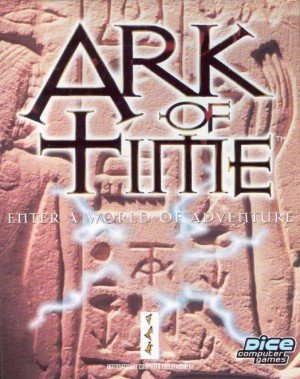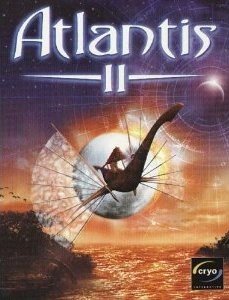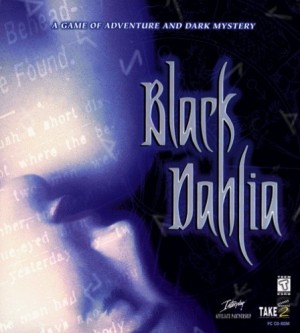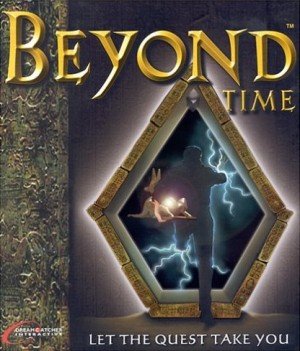Vince Twelve - Resonance interview
"Innovation is much easier to do in an amateur game where you don't have to convince a producer that your outside-the-box idea would be profitable."
Vince Twelve may not be a household name just yet, but he is the author of acclaimed Underground games Anna and What Linus Bruckman Sees When His Eyes Are Closed, which quickly established him as one of the more innovative and creative designers in the genre today. Following in the footsteps of other successful independent developers, now Vince is setting his sights even higher with his first commercial title, Resonance. Adventure Gamers recently chatted with Vince as he relaxed in his secret island lair (okay, it's not so secret, the island is Okinawa)...
 Hi Vince, can you give us a brief profile of yourself?
Hi Vince, can you give us a brief profile of yourself?
Sure. My name is Vince Twelve, originally from Omaha, Nebraska, but now I live in Japan with my wife and two year old daughter. I teach English in a junior high school and two elementary schools. In my free time, when I can find it, I love making games.
Why the "Twelve" when your real name is.... something else?
Shh, quit blowin' my cover! My father was a radio talk show host, and since his last name is a difficult-to-remember, constantly-misspelled German name, he went by the on-air moniker "Otis Twelve." I grew up being called "Vince Twelve" both on-air by my father and at school by friends whose parents listened to him. As far back as I can remember, I've been referred to by the name "Twelve," so it's kind of grown into my real name. Plus, it's fewer keystrokes...
You moved to a foreign country to teach English, you make critically acclaimed AGS games and now you're trying to take your games commercial. Are you deliberately trying to emulate Dave Gilbert, or what?
Haha, to be fair, I moved to a foreign country to teach English before he did! But Dave has influenced me in a lot of ways, not the least of which was proving that the low-res, low-to-no-budget adventure game has a small but viable market. I chat with Dave occasionally and we talk about game development. Even two years ago, before I made Linus, he was talking to me about his idea to make a game based in Korean mythology, which inspired me to base half of Linus on a Japanese myth (as I discussed in my WLBSWHEAC Post-Mortem!)
Living in a foreign country can be a big adjustment. How did you come to move to Japan and has it influenced you and your games?
I came to Japan after finishing college. I had been working a programming job in an Office Space-like setting and really wanted to do something different and interesting before devoting my life to the cubicle farm. So when I had the chance to move to Japan to teach for a year, I jumped on it. It was only supposed to be a year, but here I am four years later. Japan obviously had a big influence on one half of my last game. I live on the island of Okinawa, which has a very different culture from mainland Japan, and that is going to sneak its way into Resonance as well.
What else do you use for inspiration?
 |
Anna |
I get inspiration from so many sources. I'm a rabid consumer of entertainment. I'm always watching television shows and movies, playing games, and reading books. Anna was inspired by classic science fiction, Linus was inspired by old samurai films and Saturday morning cartoons, and Resonance is inspired by a slew of sources. But I do try and make everything unique in its own way.
Have you taken any advice or insight from any other indie game developers?
Well, for one, Deirda Kiai's insightful postings on Adventure Gamers and her blog about game design have given me ideas and inspiration, especially about how to approach dialog and branching events. I also bounce ideas off of a number of other people regularly like my good friend Erin Robinson (of Spooks fame).
So far your games have been distinctive (that's politespeak for odd!). Is there any particular reason for going for the unusual?
I'm not specifically aiming to make weird games, just interesting ones. The games that I've released have been short ones, and when you're not going too far, why not wander off the beaten path a bit? Linus, for example, was originally intended to just be a proof of concept for a fun way to use the Nintendo DS' two screens. Since it wasn't going to be a very long game, I decided to go all out on the odd. If my wacky ideas didn't translate into fun, at least it wouldn't overstay its welcome. And when a great idea is found in a small game, it paves the way for larger games to take the idea and use it to greater effect.
Anna and Linus have both had their share of acclaim. What awards or reviews for your games have been the most meaningful for you?
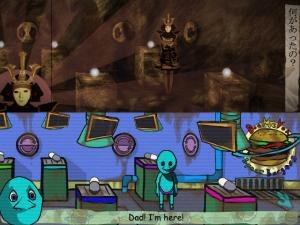 |
What Linus Bruckman Sees When His Eyes Are Closed |
The yearly AGS awards mean a lot to me even though they don't mean a whole lot to people outside of that community. It feels great to get that kind of recognition from my peers, so getting the first annual Innovation award last year really meant a lot. Also, Linus' review on Adventure Gamers was embarrassingly positive! I knew Gunnar was going a bit overboard with the compliments, but it sure felt good!
What Linus Bruckman Sees When His Eyes Are Closed won the AGS Innovation award you mentioned and you'd be hard pressed to find anyone who could argue against it being innovative. What kind of drugs were you on, and can I have some?
Heh. I was definitely happy with how it turned out. It's not for everyone, definitely, thanks to my love of obtuse logic puzzles, but I think the proof-of-concept worked out well. Oh, and no drugs (as far as I can remember).
Many commercial adventures seem to feel the need to innovate the adventure genre by throwing in RPG elements or gratuitous action sequences that arguably stop the game from being an adventure at all. I think you've achieved a different kind of innovation in your games that shows ways to be creative without turning adventure games into something else. Have you seen any signs of hope in commercial offerings?
I've seen some interesting new ideas on the Nintendo DS, and a few PC games, like Experience112 look like they could be on to something. I haven't been paying much attention to PC adventures lately, but I don't think there have been too many that attempt something too far outside of the genre's usual bag of tricks. But I don't think that lack of innovation is some kind of sin. It seems that most adventure game developers are working to please the crowd that is happy with adventure games how they are. And the fact that some devs are still making games in the genre means that they must be pleasing that crowd enough for the market to stay commercially viable. And occasionally, you're likely to see some interesting new developments. So, if by "hope" you mean "interesting innovation," no, I don't see a lot in the commercial market. Innovation is much easier to do in an amateur game where you don't have to convince a producer that your outside-the-box idea would be profitable.
Do you think the adventure genre is reviving? Did it ever really die?
I can't really speak for the state of PC adventure gaming at the moment. It's been quite a while since I've spent significant time on a non-indie commercial PC game of any genre really, though I recently enjoyed the brief but satisfying Portal. With a wife, daughter, full-time job, and a time-consuming (and now, money consuming!) hobby, most of the serious gaming that I've managed in the last couple years has all been on the Nintendo DS. And I can definitely say that for someone who takes a month or two to go through even a short game like Phoenix Wright, there's plenty going on on that little handheld.
What other games do you play?
I do get on the Wii occasionally to get beaten at tennis by my wife. I download and play a lot of indie and amateur freeware games from a number of places such as the AGS forums, but I rarely get caught up in them enough to play all the way through. I just like looking at all the unique things that people come up with. I also love browsing sites like Jayisgames.com for quirky Flash games. Oh, and I keep going back to Armadillo Run for more. That game is just brilliant!
Moving on to your commercial project in the works, please give us a quick spiel on the game for those not familiar with it.
My upcoming game is called Resonance. As the game's blurb goes, a particle physicist's mysterious and spectacular death sparks a race to find his hidden vault and claim his terrifying new discovery. The player will take control of four people whose lives become wrapped up in the search for the scientist's vault. They will have to learn to trust each other and work together to overcome the obstacles in their way to keep this new and powerful technology out of the hands of a dangerous organization that also seeks the vault.
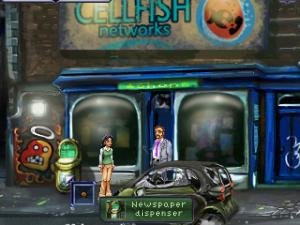 I'm hoping to use this game to demonstrate my skills as a storyteller as well as a game designer, so there will be plenty of twists and turns along the way, both for the story and for the player's brain. There will be a number of new gameplay ideas like long and short term memories for each playable character and the ability to "rewind" the game which I've quite verbosely documented in the monthly Developer's Diaries that I've been writing on the xii games blog.
I'm hoping to use this game to demonstrate my skills as a storyteller as well as a game designer, so there will be plenty of twists and turns along the way, both for the story and for the player's brain. There will be a number of new gameplay ideas like long and short term memories for each playable character and the ability to "rewind" the game which I've quite verbosely documented in the monthly Developer's Diaries that I've been writing on the xii games blog.
You mention short and long term memories for the characters; how does that work? Can the characters end up forgetting things that the players themselves have not forgotten?
Haha, wouldn't that be mean!
The two memories act as additional inventories for each character. Each new memory is stored as an item in one of these memories. When talking to another character, alongside the various dialog choices there will be a box I call the "drop box." When you see this drop box, it means that aside from choosing one of the static dialog choices, you can choose to talk about any inventory item, any short term memory, or any long term memory. This will sometimes allow a thorough player to explore the characters' reactions to events and also occasionally figure into puzzles.
The Long Term Memory (LTM) serves as a summary of the story so far, as well as containing important glimpses of the characters' pasts before the events of the game. The LTM is a bottomless inventory and it fills up automatically as the game goes on. Most of the conversations you can start from the LTM are optional and provide added depth to the characters and their backstories.
The Short Term Memory (STM) is more player-controlled. Each playable character has three STM slots which the player can fill and re-fill with anything he'd like. Literally every object you see in the game can be added to the STM and be used in conversations. You think that refrigerator might be important? Add it to your short term memory and continue on. Unless you overwrite that STM slot, you can use it in conversation anytime. Wondering why someone would have a picture of a bear hanging over their bed? Add the painting to your STM and go ask them. The STM will be used in many puzzles throughout the game in which you'll have to talk to a certain character about a relevant item to gain important information before proceeding. These puzzles will be entirely fair and logical, though, I assure you. You shouldn't have to start talking to each NPC about every object you come across. Too many combinations! With a little thought, it should become clear who needs to be told about what.
You also said that there are four player characters. How does that work? Is it like any other multi-character games (e.g. Maniac Mansion or the Blackwell series) or have you got a unique way of doing it?
For the most part, Resonance plays like a standard adventure game with multiple characters. You open a GUI to switch between characters, characters must cooperate to solve various tasks, etc. But a few interesting twists have been worked in. For example, at some points in the story, characters will split up and go in their own directions, each with their own scene. You'll be able to choose which order, breaking chronology occasionally, to play each character's scenario. This can be interesting, changing the way you look at certain events depending on the order that you play the scenarios.
Any chance of a multiplayer version, then?
Unfortunately, no. I've taken an evolutionary approach to adventure design rather than a revolutionary one.
Why did you decide to go commercial with Resonance?
The reason that I've decided to make a commercial game is not a financial one. I'm not expecting to get rich on this. In fact, I'm going to be elated if I can even break even. I decided to make a commercial game because I wanted to make something great. The team that I've assembled for this game is not a team that I could assemble without a budget. The sheer amount of backgrounds, animated characters, detailed objects, and musical scores would be impossible to create in a timely manner if I weren't reimbursing the team members for their efforts. I want to create a great game with ample length, breadth, and depth, and if I have to put up a significant amount of my own money to do so, it's going to have to be a commercial project.
What differences have you found between working on commercial and freeware projects?
When you work on a freeware game, your only customer is yourself. When you're not accountable to anyone but yourself, you can explore those crazy ideas that you have in the back of your head, and not have to worry about whether or not they turn out to be as fun as you imagine them to be because the players aren't paying you. When you're selling the game to the player, you're essentially their employee. If they don't feel that the game was worth the money they paid, you've got a big problem. In short, there's more room for innovation in the freeware space.
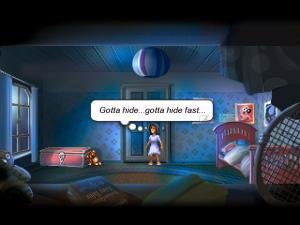 This doesn't mean that Resonance is going to be a derivative adventure. I've documented a few of the unique features of the game in my Developer's Diaries, and just this week, I've been having a back-and-forth with a reader in the comments section about the merits of a particular feature; in this case, the ability to "rewind" after failing. Through this conversation, I realized that I could better serve my customers by offering them some options regarding this ability at the start of a new game, and will edit the game's design as such. Hopefully, this attention to the needs of the player will translate into a better overall gaming experience.
This doesn't mean that Resonance is going to be a derivative adventure. I've documented a few of the unique features of the game in my Developer's Diaries, and just this week, I've been having a back-and-forth with a reader in the comments section about the merits of a particular feature; in this case, the ability to "rewind" after failing. Through this conversation, I realized that I could better serve my customers by offering them some options regarding this ability at the start of a new game, and will edit the game's design as such. Hopefully, this attention to the needs of the player will translate into a better overall gaming experience.
What has gone right and what has gone wrong while developing Resonance?
One thing that has come together really well is talent. With Shane Stevens' [The Shivah and Mind's Eye] awesome sprites, Nauris' beautiful backgrounds, and Nikolas Sideris' [A Tale of Two Kingdoms] great soundtrack, we've got a really amazing game coming together. However, the progress has been slow going. Much slower than I anticipated. Obviously, I can't pay enough to keep the lights on at everybody's houses, so each team member, including myself, is squeezing in work between other jobs and projects. I, myself, have had significantly less time to work on the game than I had originally estimated due largely to a much higher class load this year than I've had in previous years (I tend to do a lot of my work at school when I don't have classes to teach). But what we lack in speed, we're more than making up for in quality. When we're done, I think the love and care will be obvious.
Is Resonance within your original budget?
Yeah, actually, I think thanks to some team members willing to work for a combination of up-front pay and percentages of sales, the budget that I allocated at the beginning of the project will be adequate. That's one thing I think I did right. The entire budget of the game was saved up before development took place, so I don't find myself pinching pennies and searching my couches to be able to pay the team members for their work. I'm sure my wife is happy about that, too!
When do you expect to release? Will there be a demo out first?
Because this is a free-time project for me and other members of the team, the productivity waxes and wanes. This makes it very difficult to predict exactly when the game will be complete, and as such, I'm not estimating a release period at this point. When it's done is the best that I can do, as quality is more important to us than any deadline. There will certainly be a demo out before the release, but again, I can't say when.
Have you looked into distribution yet? Casual game sites, etc.
I haven't done any specific schlepping of the game around yet, but I have already begun making in-game accommodations for some of the rules that various portals have, such as an (optional) on-screen tutorial and explanation of the controls. I have also been contacted and had limited talks with one outlet interested in the game. I'm much too focused on the writing and programming of the game right now to spend much time on the business side of things. But that time will come.
You've still got your day job, but if things go really well do you think you could end up doing game development full time?
If I were a bachelor, I might throw economic caution to the wind and see what I could do on my own, but daddy's got mouths to feed, you know what I'm saying? If I were offered a job by a game company, I'd probably jump at the opportunity, but I won't be laying it all on the line to make independent games for my sole source of income. Besides, with less at risk, I'm free to take more interesting risks in the game's design. I can try out new ideas that might not be commercially successful without fear.
You're also working on programming Erin Robinson's next game, Nanobots. What can you tell us about that?
Erin's a great friend and a lot of fun to work with, so when she started work on a new game, I was aboard right away. Of course this was months before full development on Resonance started and Erin later became too busy with school to continue the game... We picked it up again a month or so ago, and I've been shaving hours off my Resonance time to implement her wacky visions.
The game is brilliant. Very unique and innovative with the same charm found in her previous game. Oh, and if you like awful puns, you're in for another heaping helping! (She claims she's been holding herself back!) Hopefully Nanobots will be ready for release in mid-February.
It's fun to work on a low stress project again, and getting away from Resonance for just a bit helps get my motivation up after having stared at that same code for months and months!
If you could take one amateur adventure to a desert island, and one professional adventure... what would they be?
I think that I would want either Duty and Beyond or A Tale of Two Kingdoms, because they're two games that I've been meaning to play since they came out, but have only managed to try out the first couple rooms. I think being on a desert island would be a good excuse to finally get around to them. Judging by what I know of some people's general sentiments towards the Myst franchise, I may take some flak for this, but I think that for the professional adventure, I'd have to take Riven. It's one of my favorite games of all time. I love and admire the way that the story grows so organically out of the environments. And the way the puzzles come together into the final meta-puzzle... perfection. But then again, when I'm stranded on a desert island, do I really want to play a game as... deserted as Riven? Oh well. If I get lonely, I can always go pester the Wahrk!
As you often ask at the end of interviews that you've conducted yourself... say something profound (or at least pithy!)
If at first you don't succeed, call the veracity and innate bias of the criteria for measuring success into question. And buy my game!



